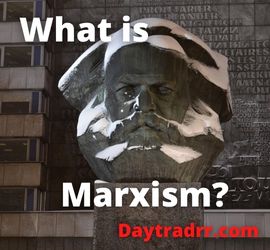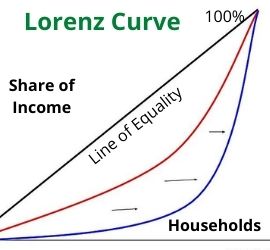What Is Marxism?
 Marxism is the political, economic, and social theories of Karl Marx embracing the inevitable evolution of harmonious, classless socialism.
Marxism is the political, economic, and social theories of Karl Marx embracing the inevitable evolution of harmonious, classless socialism.
Marxism holds that the fight between social classes is a major force in history. Further, that there will eventually be a society without classes. It investigates the impact of capitalism on labor, productivity, and economic progress. It advocates for a worker revolution to demolish capitalism and replace it with communism or socialism. According to Marxism, there is a fight between social classes. Specifically, between the bourgeoisie or capitalists, and the proletariat, or workers. Ultimately, economic relations in a capitalist economy will eventually lead to revolutionary communism.
Marxism – A Closer Look
Marxism is a social and political ideology. It includes Marxist class conflict theory as well as Marxian economics. Karl Marx and Friedrich Engels published the pamphlet The Communist Manifesto in 1848. It lays out the theory of class struggle and revolution and was the first to openly formulate Marxism. Marxian economics is concerned with the criticisms of capitalism expressed by Karl Marx in his 1867 book, Das Kapital.
Marx’s class theory depicts capitalism as one, temporary phase in the historical succession of economic systems. These systems naturally evolve and follow one another. They are propelled, he argued, by huge impersonal forces of history that manifest themselves through social class behavior and conflict. Every society, according to Marx, is divided into a number of social classes. The members have more in common with one another than with members of other social classes. The following are aspects of Marx’s theories on how the class conflict will manifest itself under a capitalist system.
Class Conflict
- Capitalist society – The bourgeoisie, or business owners, control the means of production. The proletariat, or workers, provide the labor that transforms raw commodities into valuable economic goods.
- Ordinary workers are a lower class – Laborers have minimal authority in the capitalist economic system since they do not own the means of production, such as factories, buildings, and materials. Workers are also easily replaceable during times of high unemployment. This undermines their perceived worth.
- Maximize earnings – Business owners have an incentive to get the most work out of their employees while paying them the least amount of money. This creates an unjust imbalance between the owners and the workers whose labor they abuse for their own advantage.
- Class alienation – Workers, Marx predicted, will grow alienated from the production process as well as from their own humanity. As a result, they will be resentful of the firm owner because they have no personal investment in it.
- The bourgeoisie control institutions – The bourgeoisie manipulates social institutions to their advantage. This includes the government, media, academia, organized religion, and banking and financial systems. These are tools wielded by the upper class as weapons against the proletariat. Control of these institutions helps retain their position of power and privilege. (Source: investopedia.com)
Marxism and Scientific Socialism
Marx stated that his critique of capitalism was founded on the most recent scientific advances. He labeled his theory scientific socialism. This was to separate him from the approaches of other socialists such as Henri de Saint-Simon and Charles Fourier. Marx believed them to fantasize about some future ideal society without understanding how the current society worked.
Marx’s scientific socialism combines economics and philosophy. He argued that his theory of value and the notion of alienation illustrates that a great conflict has developed. The battle has raged throughout human history between the “haves” and the “have-nots.” Marx specifically asserted that capitalism is rapidly devolving into a class conflict between two groups. The bourgeoisie, the capitalist class that owns the means of production, and the proletariat, the working class, which is at the mercy of the capitalists. Marx claimed that the laws of history show capitalism’s contradictions and the inevitability of class struggle.
Competition
Marx believed that capitalist competition would ultimately become so strong that most entrepreneurs would go bankrupt. The remaining few monopolists would control practically all output. According to Marx, this was one of capitalism’s contradictions. Competition did not provide better products at lower prices for consumers. In the long run, competition creates monopolies that exploit both workers and consumers. And what would become of the former capitalists? They would join the ranks of the proletariat. The result would be an increase in labor supply and a decrease in wages. This is what Marx refers to as a swelling reserve army of the unemployed.
According to Marx, the unplanned nature of a complex market economy is prone to economic crises. Particularly when supplies and needs become misaligned. The result is massive fluctuations in commercial activity and, eventually, severe economic depressions. Marx maintained that the more sophisticated the capitalist economy develops, the larger these contradictions and conflicts become. The more wealth capitalism creates, the more seeds of its own demise it sows. Eventually, the proletariat will recognize that it possesses the collective capacity to depose the few remaining capitalists. Once these few are toppled, the whole system collapses.
Marx believed that the entire capitalist system, with its private property, money, market trade, profit-and-loss accounting, labor markets, and so on, needed to be abolished and replaced with a fully planned, self-managed economic system that put an end to exploitation and alienation. Marx argued that a socialist revolution was unavoidable. (Source: econlib.org)
Marxism – Revolution and the Demise of Capitalism
Marx believed that the capitalist system was so flawed as to ultimately destroy itself. The upper class’ alienation and exploitation of the proletariat would ultimately force the working class to rebel. Ultimately, workers would seize control of the means of production. This revolution would be conducted by educated leaders known as the vanguard of the proletariat.
Enlightened leaders would understand society’s class structure and unite the working class through elevating awareness and class consciousness. Marx prophesied that as a result of the revolution, private ownership of the means of production would be replaced by collective ownership. As a first step, under socialism, but subsequently under communism. Social stratification and class conflict would no longer exist in the last stage of human development.
Marx maintained that the more sophisticated the capitalist economy, the larger these contradictions and conflicts become. The more wealth capitalism creates, the more seeds of its own demise it sows. Eventually, the proletariat will recognize that it possesses the collective capacity to depose the few remaining capitalists.
Marxism in Hindsight
Despite the fact that Marx inspired a large number of followers, many of his forecasts did not come true. Marx felt that rising competition, rather than providing better commodities for consumers, would lead to capitalist bankruptcy.
- Rise of monopolies – Ultimately, it would lead to the rise of monopolies as fewer and fewer capitalists were left to dominate production.
- Unemployed masses – Former capitalists who had gone bankrupt would join the proletariat, eventually forming an army of the unemployed.
- Supply and demand chaos – Furthermore, the market economy, which is unplanned by definition, would face massive supply-and-demand issues, resulting in severe depressions.
Nonetheless, capitalism has not imploded as a result of severe rivalry over the years. Although markets have evolved over time, they have not resulted in an overabundance of monopolies. Wages have risen and profits have not fallen. This is despite the fact that economic inequality has grown in many capitalist economies. And, while recessions and depressions have occurred, they are not regarded to be an intrinsic feature of free markets. Indeed, a society without rivalry, money, or private property has never existed.
Final Words
Marx was undoubtedly a sophisticated thinker who garnered millions of followers all over the world. His predictions, however, have not stood the test of time. Despite changes in capitalist markets over the last 150 years, competition has not degraded into a few monopolies. Real wages have grown, while corporate margins have remained stable. There has also been no development of a reserve army of the unemployed. We do experience business cycles, but more and more economists believe that significant recessions and depressions are the unintended consequences of state intervention rather than an inherent feature of markets. For example, monetary policy implemented by central banks and government policies on taxation and spending.
To be sure, socialist revolutions have occurred all throughout the world. But, Marx’s theory predicted they would occur in the most advanced capitalist countries. On the contrary, poor, so-called Third World countries were pushed to adopt socialism. For whatever reasons, these revolutions consigned the masses to systemic poverty and political despotism. In practice, socialism completely failed to build a society that was nonalienated, self-managed, and fully planned. It failed to emancipate the masses. Instead, it crushed them via statism, dominance, and the terrible abuse of state authority.
Up Next: What Is the Full Retirement Age (FRA) in the USA?
 Full retirement age (FRA) in the USA ranges from age 65-67 when workers can claim full, unreduced Social Security retired-worker benefits.
Full retirement age (FRA) in the USA ranges from age 65-67 when workers can claim full, unreduced Social Security retired-worker benefits.
The full retirement age (FRA), is often known as the normal retirement age. It is the age at which persons can retire and receive full retirement benefits. In the United States, for example, the FRA for collecting Social Security payments is 66 for those born between 1943 and 1954. However, it is 67 years of age for those born in 1960 or later. 66 plus two, four, six, eight, or ten months for those born between 1955 and 1959. Between 1955 and 1959 the age increases by two months each successive year. Why does it matter? because claiming benefits before your FRA will reduce your benefit. Whereas claiming after your FRA will boost the amount by 8% annually, adjusted in monthly increments of 0.6-0.7 percent. The maximum benefit a person can receive comes at age 70.




